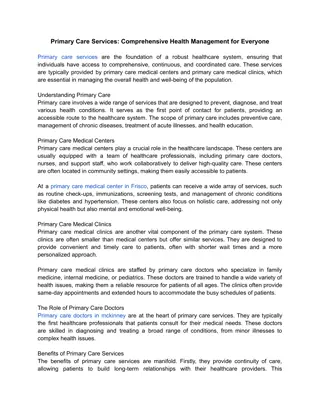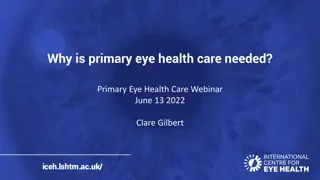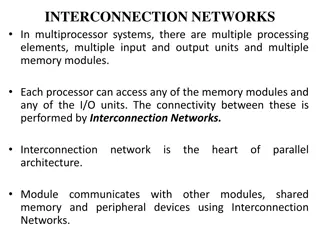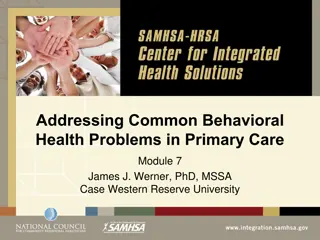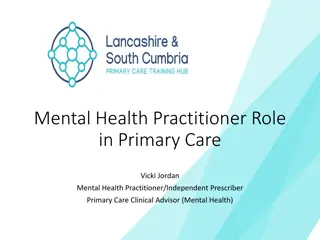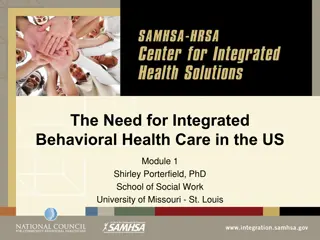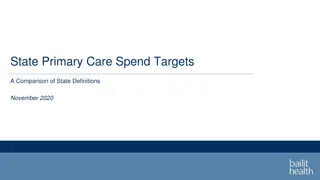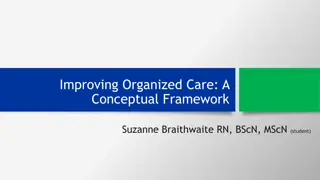Understanding Primary Care Networks in Harrogate
Primary Care Networks (PCNs) play a crucial role in reshaping healthcare services in the NHS, focusing on out-of-hospital care and closer collaboration between different services. In Harrogate, the local Clinical Commissioning Group (CCG) has endorsed 4 PCNs covering the entire GP registered population. These networks are formed through partnerships between general practices and other healthcare services, aiming to enhance patient access, skills, and partnerships. Each PCN has a designated GP Clinical Director responsible for network development and collaboration with local services. Over the coming months, PCNs in Harrogate will concentrate on internal organizational development as outlined in their agreements.
Download Presentation

Please find below an Image/Link to download the presentation.
The content on the website is provided AS IS for your information and personal use only. It may not be sold, licensed, or shared on other websites without obtaining consent from the author. Download presentation by click this link. If you encounter any issues during the download, it is possible that the publisher has removed the file from their server.
E N D
Presentation Transcript
Heart of Harrogate PCN Andrew King Managing Partner Leeds Road Practice 1
Primary Care Networks Why? There is a commitment in the NHS Long Term Plan (published January 2019) to invest in Primary Care as part of a new service model for 21st century recognising that the NHS needs to change the way it works to improve patient experience. One of the key areas in the Long Term Plan is to boost out-of-hospital care and get all NHS services working much more closely together, breaking down barriers between services.
Primary Care Networks Why? In Primary Care this is being achieved through: Setting up Primary Care Networks serving populations between 30,000 50,000 patients Additional investment by introducing new clinical staff roles into primary care and increasing technology such as on-line services Moving to GPs and practice nurses working with a wider range of clinicians in a much more joined up way
Primary Care Networks Why? Historically general practices have worked in silos , but over the last few years, many practices have formed partnerships or networks and have found benefits for both the practice and the patients through: Sharing workforce and reconfiguring services to improve access; increasing skills in general practice by introducing new roles such as clinical pharmacists, paramedics and physiotherapists; developing partnerships with other community and secondary care services. Evidence from these initiatives have led to the new Primary Care Network Agreement.
Primary Care Networks in Harrogate Nationally all CCGs have been working in line with the guidance and have submitted applications on 15 May 2019 for their Primary Care Networks (PCN). In Harrogate, the CCG have endorsed 4 Primary Care Networks covering the whole GP registered population these networks are made up of our 17 and our GP Federation - YHN , who have come together and signed an agreement which will bind how they will work together for the future. Each PCN has appointed a local GP Clinical Director who will be responsible for the development of the Network and ensuring the network engages and works closely with other local services serving its population.
Harrogate Primary Care Networks Over the next 9 - 12 months, the main concentration will be PCN internal organisational development by 30 June each PCN had agreed their Primary Care Network Agreement which includes a number of schedules which will explicitly set out their governance, financial, organisational and engagement arrangements. From July 2019, the PCNs will are funded to recruit two new additional staff roles into their PCNs Clinical Pharmacists and Social Prescribers. These staff roles are currently already in existence in some practices across the area but this will give equity of access for patients to these roles when agreed.
Additional Roles in PCNs Social Prescribers Currently reviewing the role and function locally and how we will recruit, develop and train. From April 2020 onwards PCNs will be funded to recruit Physiotherapists, Physician Associates and Paramedics these roles will support multi-disciplinary working arrangements, ensuring patients will have access to more services in primary care.
Network Service Specifications A key component of the Network Contract DES will be the development and implementation of seven national service specifications which will evolve over time to support specific delivery goals in the Long Term Plan. From Service Specification April 2020 Structured Medication Reviews and Optimisation Enhanced Health in Care Homes Anticipatory Care Supporting Early Cancer Diagnosis Personalised Care April 2021 CVD Prevention and Diagnosis Tackling Neighbourhood inequalities
What happens now? We do not expect patients will see any changes in the way they receive care in general practice in the short term while PCNs are working up their arrangements for working together. Live Social Prescribers will hopefully start this financial year and all practices will have access. Clinical pharmacists may also be working across the PCN who who will carry out functions supporting new and current working systems These roles were only available in certain practices but now all patients will have access.
What happens now? Going forward the PCNs will be responsible for delivering the outcomes of the new service specifications PCNs will link more closely with community services to help improve patient experience Patients from one practice in a PCN could access services in another practice in the PCN where specialist services are being provided for the registered list of the PCN.
What happens now? These new arrangements do not affect your patient registration. Your GP practice will still be providing the core services of general practice and the services under the new PCN contract are additional services. PCNs are set up to support practices within their network, thus putting more resilience into general practice.







